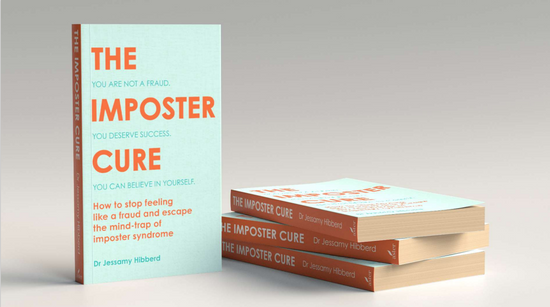Start exploring!
We'll be adding to our collection of recommended books. In the meantime please enjoy this book by Dr Jessamy Hibberd and the career Q&A's she wrote under Read more, where you'll also find the link to purchase the book online from Amazon.
-
Featured Book
-

The Imposter Cure
Dr Jessamy Hibberd
Imposter syndrome is a phenomenon in which people believe they are not worthy of success. They convince themselves that they have done well due to luck and are terrified their shortcomings will eventually be exposed, making it impossible to enjoy their accomplishments.
YOU'VE GOT THIS - explores the psychological impact of imposter syndrome and exposes the secrets fears and insecurities felt by millions of men and women. Dr Jessamy Hibberd provides sound expert advice to help the reader better understand the problem and overcome it, so they think differently, gain self-belief and learn to see themselves as others do.
Filled with case studies to bring the concepts alive and packed with strategies to increase confidence, this book is a must-read for anyone who has struggled with their achievements.
Collapsible content
Read more
You can purchase the book on Amazon here.
Gordon Holmes from MyCareerBrand attended a workshop with the NZ Psychological Society led by Dr Jessamy Hibberd.
Gordon followed up with questions to Dr Hibberd.
Here are her answers.
What is imposter syndrome?
Imposter syndrome was first described by two clinical psychologists - Dr Clance and Dr Imes in 1978 as a phenomenon in which people believe they are not worthy of success and have a persistent belief in their lack of ability, skills or competence. Despite evidence to the contrary.
I think of it as a faulty belief. Doing something difficult or trying something new pushes you out of your comfort zone and it’s natural to experience some fear. This discomfort is something we all experience; it’s a normal response and is caused in part by uncertainty. It just means you care about what you’re doing, but you’re not sure if you can do it yet.
It’s how you interpret that feeling of discomfort that is key. When imposters experience it they recognise the feeling as meaning they are a fraud, falsely believing that if they were good enough or ready for this challenge they wouldn’t feel like this and imagining that confident people feel differently.
The reality is that these things are difficult for everyone; we all feel uncertain of ourselves at times, but imposters misinterpret this rather than recognising it as normal and part of being human.
Who does it impact?
When I told people I was writing a book - the most common response was - I think I’ve got that - is it normal! Research shows 70 percent of people may experience the phenomenon, according to a 2011 article published in the International Journal of Behavioral Science.
Imposter syndrome was originally thought to only affect women, however research now shows that it doesn’t discriminate. We now know it affects both men and women, occurs across different cultures and it causes problems for everyone from students to CEO’s and it’s not just in work we feel it, it can affect our relationships, our friendships as well as our confidence as parents.
In terms of gender split a study in 2018 found in the past year 2/3 of women had experienced imposter related thoughts and just over 50% of men. This study found that employees were not just experiencing detrimental effects at work but also at home. Employees were emotionally drained and struggled to maintain family and work demands.
How does it show up at work and in careers?
It’s hard to see it yourself, but if you answer yes to any of these questions you may well be struggling with imposter syndrome:
- Is it hard for you to accept compliments or recognise your achievements?
- Do you feel at times that your success has been largely down to luck?
- Are you afraid people might find out that you’re not actually as clever or competent as they think?
- Do you believe you don’t deserve your success?
- Do you compare yourself to others and imagine they know what they’re doing and are more competent than you?
What can I do to address it?
Two strategies to start with are to externalise the imposter voice and to see your success. There are lots more in the book!
Externalize the imposter voice
The first strategy is to externalize the imposter voice. This might sound a bit strange! You need to see that this is not your voice, but the voice of your fears. The better you get at spotting the imposter voice in action, the more successfully the strategies will work.
Think of this voice as a bully. Every day it tells you that you’re not good enough, you need to work harder, never fail and do everything perfectly – and threatens that if you don’t everyone will know you’re a fraud. The voice scares you into doing what it wants, promising to keep you safe, but this voice is your enemy not your friend. It doesn’t have your best interests in mind.
Develop a compassionate voice instead; it’s the perfect antidote to the self-critical and perfectionist thinking. Next time you feel discomfort remind yourself that this is just how you feel, not how things are and remember thoughts aren’t facts.
See your success
To overcome imposter syndrome you have to connect to all you’ve done. This means taking on board your success so it becomes something you know about yourself. This lets you look at the full picture of your life - rather than just the bits you’re unhappy with.
Write down what you do and all your achievements as if it’s a CV. If something comes into your head, note it down. Don’t question it; don’t allow any excuses to get in the way – for now just put them to one side. All I want to know is what’s happened and your part in making it happen.
- Note down anything and everything that comes to mind
- Your job and responsibilities
- Exams and qualifications
- Job promotions and salary increases
- Compliments and praise from friends, family or colleagues
- Difficult situations you’ve overcome
- Explore every achievement you can think of – no matter how big or small.
Read back through what you’ve written down. See what you’ve accomplished? What would your 18-year-old self think of where you are now? There’s no issue with how you’re doing by anyone else’s standards it’s how you view yourself that’s the problem. If you have time - come back to this exercise and spend longer over it - it’s something I do in therapy and I get people to read it every day.
What resources can I draw on?
My book is called The Imposter Cure if you’d like to read more on the topic. Dr Valerie Young is also an expert in this area.
More Books
Other books we recommend
This is where you'll find all sorts of articles and books that we believe you'll find useful to refer to as you develop your career.
| Title | Synopsis |
| Imagine it Forward | Change - in your career, in your company, in your life - starts with you. You have to imagine a future that others can't yet see, and take the initial steps to make it real. Give yourself permission and then pass it on. |
| The 8th Habit | From Stephen R. Covey comes a profound, compelling, and groundbreaking book of next-level thinking that gives a clear way to finally tap the limitless value-creation promise of the “Knowledge Worker Age.” |
| Perform Under Pressure |
Perform Under Pressure will help you not only survive but thrive in situations that up until now have been holding you back. Targeting the moments when you are most stressed and uncomfortable, Dr Ceri Evans' red-blue mind model converts his clinical insights into a simple approach that will help you gain emotional control when you need it most. If you want to be better at what you do, pressure is unavoidable. This book will help you feel comfortable being uncomfortable, overcome mental obstacles and unlock your true potential. 'We all feel pressure. Ceri just makes it easy to understand so you can deal with it.' STEVE HANSEN, All Blacks coach |
Choose a Coaching Solution
Explore coaching options to shift your reading into top gear and advance your career.


